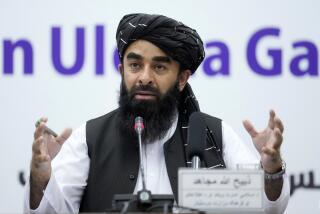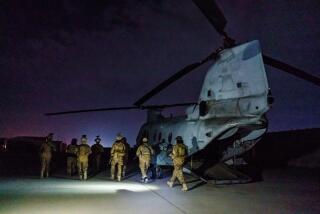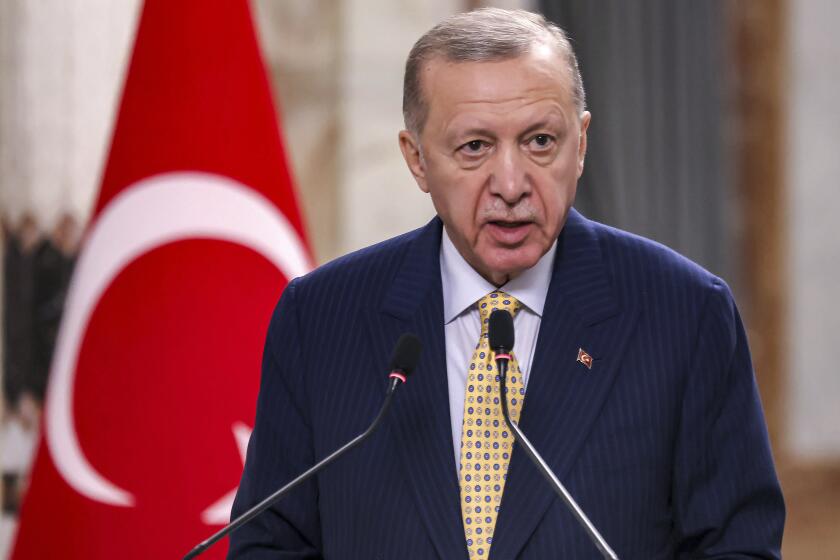Postwar U.S.-Afghanistan ties are expected to remain rocky
The wartime alliance between Afghanistan and the United States in the last decade has been fraught with suspicions over sharply differing goals and tactics. It is becoming clear that any postwar partnership to prevent a Taliban comeback is likely to be just as problematic.
Despite compelling common interests, stark differences already have emerged between Washington and the Afghan government about the military landscape after 2014, when most U.S. combat troops are gone and Afghan security forces are in charge of keeping the country safe.
President Hamid Karzai says Afghanistan will zealously guard its sovereignty and tightly govern the actions of any foreign troops on its soil — while continuing to expect massive infusions of U.S. and other foreign aid for training and equipping his police and army.
U.S. officials say little publicly about negotiations with Karzai’s government over a future “strategic partnership,” which have been going on for more than a year. But Western officials familiar with the talks say the Obama administration wants continued access to at least some military installations, even after they have reverted to Afghan command. Also considered crucial to U.S. interests is the ability to field small, elite teams of special operations troops to carry out targeted strikes on insurgents.
Afghans widely loathe those raids, especially when they involve U.S. troops entering residential compounds at night. Karzai has long accused the American-commanded NATO force of being insensitive to cultural considerations, as well as civilians’ safety, during night raids.
With Iraq as a guide, U.S. officials are keenly aware that long-term issues that go unaddressed at the height of combat may become considerably harder to resolve in the war’s winding-down phase.
In Iraq, the stumbling block was refusal to grant remaining U.S. troops immunity. When it became clear that Prime Minister Nouri Maliki could not gain agreement within his coalition for a deal that would shield U.S. forces from prosecution for violating Iraqi laws, President Obama announced in October that the U.S. would withdraw virtually all of its troops by the end of the year — meeting a deadline set during the Bush administration.
Afghan unhappiness with U.S. tactics resurfaced this month during a traditional grand council, or loya jirga, convened by Karzai in Kabul. The Afghan leader opened the gathering with a denunciation of U.S.-led night raids, demanding an end to them as a condition for signing a strategic partnership pact.
“We are lions!” he declared. “A lion hates a stranger entering his home. A lion dislikes a stranger trespassing in its space. A lion does not want his offspring taken away at night.”
American officials have so far disregarded Karzai’s complaints about the raids, which proceed at a pace of about a dozen a night. They are seen by U.S. commanders as one of the most effective means of combating the insurgency, leading to the killing or capturing of hundreds of Taliban field commanders.
Karzai and the Obama administration have been at pains to avoid antagonizing regional powers such as Iran, Russia, Pakistan and China with talk of a continuing American military presence, even though there could be thousands of U.S. troops staying on after 2014.
“Any post-2014 presence will be at the invitation of the Afghan government, and would ensure that the United States will be able to target terrorists and support a sovereign Afghan government so that our enemies can’t outlast us,” said Tommy Vietor, spokesman for the U.S. National Security Council.
The strategic partnership “is not aimed at any of Afghanistan’s neighbors, and we don’t seek permanent bases,” Vietor said.
Outlasting the West, though, seems like an increasingly viable option for the insurgency. After 10 years of conflict, another “fighting season” or two, replete with hit-and-run guerrilla-style attacks against a more powerful foe, do not appear an insurmountable challenge for the Taliban.
Efforts to open channels of communication with the Taliban have faltered in recent months, perhaps reflecting a calculation by the insurgents that they can afford to wait.
At the grand council, delegates offered few concrete ideas for reviving a peace process thrown into disarray by the assassination in September of Burhanuddin Rabbani, who headed the commission in charge of making overtures to the Taliban.
Rabbani’s killer posed as a Taliban peace envoy and had a bomb concealed in his turban.
But it also is clear that the Taliban and other insurgent groups feel threatened by the prospect of an American military presence after 2014, whatever form it may take. In recent weeks, the Taliban leadership has sought to whip up public opposition to the pact, calling it an American scheme to dominate Afghanistan indefinitely.
“The Afghan crisis will only find an end when our nation thwarts the strategic partnership of the invaders and their mercenaries,” the Taliban said in a statement on the eve of the Kabul gathering.
The United States, together with most of its allies in the North Atlantic Treaty Organization force, hopes to focus its attention after 2014 on training and mentoring Afghan forces. But planned expenditures are being reevaluated by increasingly cash-strapped Western militaries.
The current $11 billion in annual costs for Afghan security forces, virtually entirely borne by foreigners, is expected to fall to about $4 billion by 2014. Karzai repeated a call for upgraded armaments at the loya jirga, but he is unlikely to get weapons such as Abrams battle tanks or F-16 fighter jets.
From the American vantage point, Karzai’s flagging domestic popularity, and the sometimes inflammatory statements he makes to try to bolster it, must be taken into account. The Afghan leader’s political foes are ready to criticize any perceived willingness to capitulate to American demands.
A day after the loya jirga endorsed Karzai’s conditions for a long-term agreement, hundreds of demonstrators gathered in the eastern city of Jalalabad to shout their opposition to the security pact. “Death to America! Death to Karzai!” some yelled.
“A partnership with the United States is vital,” said Robaba Parwani, a member of parliament who took part in the loya jirga. “But in the last 10 years, the international community has not delivered what it promised. So we have to make sure that what happens next doesn’t cause more harm to the people of Afghanistan.”
Times staff writers David S. Cloud and Christi Parsons in Washington contributed to this report.
More to Read
Sign up for Essential California
The most important California stories and recommendations in your inbox every morning.
You may occasionally receive promotional content from the Los Angeles Times.









